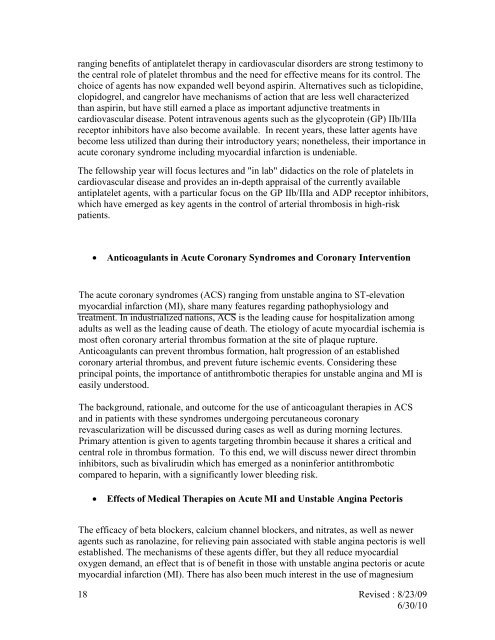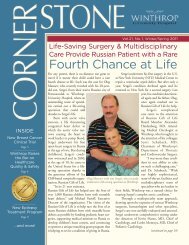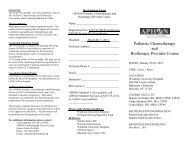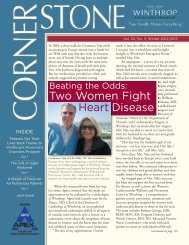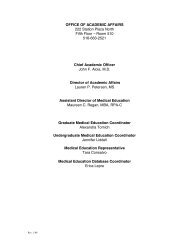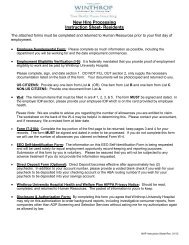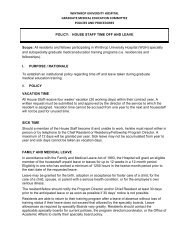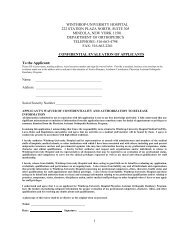interventional cardiology fellowship curriculum - Winthrop University ...
interventional cardiology fellowship curriculum - Winthrop University ...
interventional cardiology fellowship curriculum - Winthrop University ...
Create successful ePaper yourself
Turn your PDF publications into a flip-book with our unique Google optimized e-Paper software.
anging benefits of antiplatelet therapy in cardiovascular disorders are strong testimony to<br />
the central role of platelet thrombus and the need for effective means for its control. The<br />
choice of agents has now expanded well beyond aspirin. Alternatives such as ticlopidine,<br />
clopidogrel, and cangrelor have mechanisms of action that are less well characterized<br />
than aspirin, but have still earned a place as important adjunctive treatments in<br />
cardiovascular disease. Potent intravenous agents such as the glycoprotein (GP) IIb/IIIa<br />
receptor inhibitors have also become available. In recent years, these latter agents have<br />
become less utilized than during their introductory years; nonetheless, their importance in<br />
acute coronary syndrome including myocardial infarction is undeniable.<br />
The <strong>fellowship</strong> year will focus lectures and "in lab" didactics on the role of platelets in<br />
cardiovascular disease and provides an in-depth appraisal of the currently available<br />
antiplatelet agents, with a particular focus on the GP IIb/IIIa and ADP receptor inhibitors,<br />
which have emerged as key agents in the control of arterial thrombosis in high-risk<br />
patients.<br />
<br />
Anticoagulants in Acute Coronary Syndromes and Coronary Intervention<br />
The acute coronary syndromes (ACS) ranging from unstable angina to ST-elevation<br />
myocardial infarction (MI), share many features regarding pathophysiology and<br />
treatment. In industrialized nations, ACS is the leading cause for hospitalization among<br />
adults as well as the leading cause of death. The etiology of acute myocardial ischemia is<br />
most often coronary arterial thrombus formation at the site of plaque rupture.<br />
Anticoagulants can prevent thrombus formation, halt progression of an established<br />
coronary arterial thrombus, and prevent future ischemic events. Considering these<br />
principal points, the importance of antithrombotic therapies for unstable angina and MI is<br />
easily understood.<br />
The background, rationale, and outcome for the use of anticoagulant therapies in ACS<br />
and in patients with these syndromes undergoing percutaneous coronary<br />
revascularization will be discussed during cases as well as during morning lectures.<br />
Primary attention is given to agents targeting thrombin because it shares a critical and<br />
central role in thrombus formation. To this end, we will discuss newer direct thrombin<br />
inhibitors, such as bivalirudin which has emerged as a noninferior antithrombotic<br />
compared to heparin, with a significantly lower bleeding risk.<br />
<br />
Effects of Medical Therapies on Acute MI and Unstable Angina Pectoris<br />
The efficacy of beta blockers, calcium channel blockers, and nitrates, as well as newer<br />
agents such as ranolazine, for relieving pain associated with stable angina pectoris is well<br />
established. The mechanisms of these agents differ, but they all reduce myocardial<br />
oxygen demand, an effect that is of benefit in those with unstable angina pectoris or acute<br />
myocardial infarction (MI). There has also been much interest in the use of magnesium<br />
18 Revised : 8/23/09<br />
6/30/10


